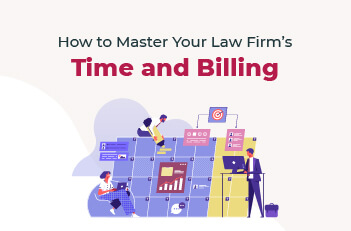Matter Cost Tracking Made Simple
Matter costs and frozen yogurt toppings have a few things in common. If you’ve ever taken a child to a self-serve fro-yo shop, you know what we mean. It all starts with some sprinkles—or filing fees—and things quickly spiral out of control from there. Bit by bit, those unexpected “extras” add up to a total that will throw you for a loop.
But there’s a big difference between a frozen dessert and a legal matter.
When it comes to family fro-yo night, an unexpected expense isn’t a big deal every now and then. Matter costs aren’t so occasional. They accrue daily, and too many of them can quickly make your matters unprofitable.
Here’s how you can protect your matter budgets from being eaten up by out-of-control and untracked costs.
What are matter costs?
Certain costs are at the core of everything your legal practice achieves. Think electricity, rent, salaries, and—unofficially—coffee. These are overhead costs. They’re necessary for your firm to function. You’ll incur them whether or not you’re working on a specific client matter, so they’re included in your firm’s operating budget.
Other expenses are less broad. They’re directly tied to your work on a specific client's legal matter. Expert witness fees, printing costs, case-related travel fare—these are all matter costs.
Matter costs can be divided into two main categories.
Hard matter costs
Client-related costs that are direct and easily quantifiable are considered hard matter costs. Attorneys receive (and hopefully hang onto) a receipt or invoice for these costs. They’re related to tangible items, so it’s reasonable to bill your client for these costs.
Hard matter costs might include:
- Court costs
- Depositions
- Expert witness fees
- Filing fees
- Mediation fees
- Medical record expenses
- Printing costs
- Transcription costs
- Travel expenses
Soft matter costs
Expenses that are less explicit are considered soft costs. These are those “sneaky” expenses that aren’t quite as easy to track because you won’t always receive receipts for them.
Some soft matter costs are a subset of your overhead costs. For example, your firm uses electricity and paper clips for every matter, but your firm isn’t billed for them by the client. You won’t typically invoice individual clients for these resources, either.
Soft matter costs can include:
- Clerical services
- Delivery services/Couriers
- Dinner/drinks for client meetings
- Legal research costs
- The marketing spend spent to obtain the client
- Office supplies
- Postage fees
- Part of the cost of your legal software subscriptions
- Time spent by legal staff to coordinate the details of the matter
Ultimate Guide to Law Firm Business Intelligence
Are you sure about running a law firm without regularly analyzing performance data?
There are just certain things in life that you wouldn’t, even couldn’t, do without a little research and background information. Running a legal practice is definitely one of those things.
Five great reasons to track matter costs
Whether matter costs are hard or soft, you’ll want to track them closely. Here’s why:
1. You need them to set profitable rates
“You’ve got to spend money to make money” doesn’t apply here. You should never spend more to accept legal matters than you make completing them. But if you aren’t tracking matter costs in enough detail, you just might.
Even the soft costs of each legal matter need to be calculated to ensure your rates cover the cost of doing business (and then some).
2. They allow you to bill clients accurately
When it comes to your law firm’s finances, every dollar counts. But no client will give you a dime if they feel their invoice doesn’t add up. If expense tracking is lacking at your firm, your clients won’t understand what they’re being charged for. Understandably, they’ll give pushback about unclear bills. (And in some cases, they might even file a complaint.)
It’s also unethical to bill clients for expenses you don’t have proof of (no matter how well you remember them). Thus, when expense tracking records are incomplete, you’ll inevitably undercharge your clients—and wind up with underwhelming revenue, too.
3. Without them, you might run into compliance violations
Law firms must provide itemized bills to clients upon request. Charging clients for matter costs you didn’t track can lead to a violation, putting your firm at risk of disciplinary action by your state bar association.
4. Tracking leads to better project management
Believe it or not, expense tracking and legal project management go hand-in-hand.
If your approach to a particular matter requires more soft costs than you anticipated, this could be a sign that you’re not completing it in the most efficient way. If this is a pattern you’re seeing across several matters in a certain practice area, you may need to adjust your workflows for future matters.
5. You’ll establish more accurate financial planning
By tracking matter-related expenses, you gain a better understanding of your firm’s financial position. When you make data-informed decisions about how to allocate your firm’s resources, you’ll see higher profits and more financial stability.
Tracking soft matter costs, in particular, can contribute to more accurate overhead budgeting since most soft costs can’t be passed on to your clients.
Common pitfalls of matter cost accounting
Despite the struggle, most attorneys make their best effort to track matter costs. Still, mistakes happen, especially when your firm lacks a clear and convenient expense tracking process.
What’s your firm’s track(ing) record for these common pitfalls?
Forgetting billable expenses
Any legal client will tell you—billable expenses add up quickly. But only if they’re tracked and invoiced. Attorneys often forget to track expenses for small details, like printing, postage, or phone calls, which digs into your bottom line over time.
Inaccurate expense records
For budgeting and billing alike, consistency is key. But while every expense is worth tracking, not every matter-related cost is worth billing for. To charge your clients reasonably across the board, attorneys must label tracked expenses appropriately.
With some close review, you may be surprised how much revenue your firm misses due to attorneys labeling billable expenses as non-reimbursable. When attorneys mistakenly attribute costs to the wrong client, billing delays and client complaints arise, costing your firm time and money.
Not tracking costs in real time
The longer attorneys wait to track matter costs, the less accurate they are. Since overbilling is unethical, this can lead to underbilling clients instead.
Waiting to track costs also limits your agility in managing them. When overspending is immediately flagged, you can be more proactive about protecting your firm’s profitability.
Improve your firm’s matter cost tracking
If poor expense tracking is lacking, take action. Whether you implement all of these tips or just a few, your practice and your clients will benefit.
Establish an expense tracking system
A well-considered approach to expense tracking is a must. But it won’t do much good if your attorneys aren’t familiar with it. Try creating a standard operating procedure (SOP) for your firm that attorneys can refer back to as needed.
Make sure it includes:
- How to categorize expenses (ex., soft vs. hard costs, matter costs vs. overhead costs, and reimbursable vs. non-reimbursable costs)
- Approved tools for expense tracking (and how to use them)
- How often new expenses, including matter costs, should be entered
- The process for approving expenses
Make expense tracking accessible on the go and offline
Matter costs often arise outside of the office. Ensure attorneys can track them efficiently by adopting software that lets them track matter costs on their mobile devices.
Ideally, your expense tracking software should also store expenses that are tracked offline and upload them when the device is reconnected. You never know when someone will get stuck in an area with poor service.
Keep it simple
Attorneys won’t track matter costs if it takes too much time. Choosing expense-tracking software that integrates with your practice management software can help because it allows attorneys to easily track their matter expenses within the same interface they use to track their matters.
Use software that automatically tracks costs and integrates with practice management
“Tracking” expenses with paper receipts and sticky notes in a filing cabinet wasn’t effective even when it was standard practice. These days, it’s borderline irresponsible.
Instead, use cloud-based software to automatically track expenses as they arise. It saves time, improves accuracy, and makes it much easier to identify bill clients for reimbursable matter costs.
Use dashboards to track your costs in real time
Looking back on expenses a month at a time has its uses. But monitoring matter costs as you go allows you to make data-driven adjustments in real time, so that every legal matter is completed on time and within budget.
See how our software leads to higher profits, happier clients—and easier expense tracking
Rocket Matter makes it simple to track matter costs from anywhere so your matter budgets stretch farther. Try us for free, or schedule a personalized demo today!
Ultimate Guide to Law Firm Business Intelligence
Are you sure about running a law firm without regularly analyzing performance data?
There are just certain things in life that you wouldn’t, even couldn’t, do without a little research and background information. Running a legal practice is definitely one of those things.
Related Resources

How to Increase Your Profits with Rocket Matter
Lawyers in firms of all sizes struggle to finish the work for the day in a reasonable amount of time. With document creation, non-billable tasks, and time spent following up with current and potential clients, the workday quickly turns from a planned eight-hour day into a twelve-hour one.

How to Master Your Law Firm’s Time and Billing
Lawyers have a heavy workload. With so many clients and their various needs, it’s easy to put tedious administrative tasks like time tracking and billing on the back burner.

6 Billing Strategies to Grow Your Law Firm
Scaling your law firm doesn’t just mean adding more lawyers or increasing your number of clients. The best way to boost your law firm’s finances is to minimize your non-billable hours and make sure that every hour of your day is accounted for.
Share post:








